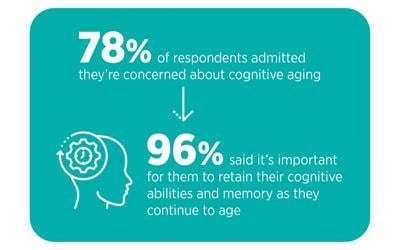
(Photo by Anna Shvets via Pexels)
Are mom, dad, grandma and grandpa “too online”? A new survey looked at how older Americans are using screens and technology — and it turns out their habits may not be so different from their younger relatives.
Commissioned by Centrum Silver, a multivitamin supplement for cognitive support, the research set out to learn more about the cognitive abilities as people age. It found the average respondent spends a collective 22 hours per week in front of some type of screen.
The Talker Research survey of 2,000 Americans aged 50 and over revealed most of their screentime is used watching TV, followed by searching the internet, playing a game and working on a computer.

(Talker Research)
They also spend time daily talking or videochatting on the phone, scrolling through social media and reading on an e-reader or tablet.
Despite these tech-laden daily routines, many have heard that screen time is harmful — from being “addictive” (39%) to “rotting the brain” (23%).
That concern ties to a broader reality: more than three-quarters (78%) of older adults worry about cognitive aging, and nearly all (96%) say it’s important for them to maintain their cognitive abilities and memory as they continue to age.

(Photo by Kampus Production via Pexels)
“The survey findings reveal a real tension: many older adults see screen time as a daily part of life, even as they worry it could be harmful,” said Josh Gabriele, Brand Director, Centrum. “Yet when used actively with intention – like reading, learning, playing certain games or connecting with others –recent research shows that screen time can actually help keep the mind engaged and resilient.”
The study also found most older adults recognize there’s benefits of screen time, as well. A majority say screen time has helped them feel more connected (58%) and up-to-date (54%), while others noted it makes them feel more educated (39%) or improves their mood (36%).
Nearly three-fourths (73%) of adults 50 and old believe it’s important to actively engage with new technology. In fact, 54% believe actively engaging with new technology has improved their memory.
One group have already put this belief to the test. Thirty-four percent said having screentime has helped keep them mentally sharp.
“What this tells us is that older adults already have a wide toolkit of everyday habits to support their brain health — from puzzles and reading to staying curious and connected,” continued Gabriele. “Importantly, this study found nearly half (45%) of adults over 50 take a multivitamin as part of their routine.
“These findings reinforce a broader truth: older adults aren’t just consuming content — they’re actively building routines that help keep their minds sharp. And whether through games, learning new skills or incorporating a trusted daily multivitamin, they’re proving that ‘screen time’ can also be ‘brain time.’”

(Photo by SHVETS production via Pexels)
WHAT ARE OLDER AMERICANS DOING TO HELP THEIR COGNITIVE ABILITIES?
When asked what they do to support their cognitive abilities, older adults reported:
- Doing puzzles/playing games — 67%
- Reading — 59%
- Staying up-to-date on current events — 47%
- Watching TV shows and movies — 45%
- Taking a multivitamin — 45%
- Trying new things (i.e., different activities, etc.) — 36%
- Learning about new things (i.e., viral trends, new technology, etc.) — 35%
- Using technology — 34%
- Taking a supplement for brain or memory support — 26%

Vitaly Gariev
Survey methodology:
Talker Research surveyed 2,000 American adults (age 50 and older); the survey was commissioned by Centrum Silver and administered and conducted online by Talker Research between Sept. 9 –16, 2025.
We are sourcing from a non-probability frame and the two main sources we use are:
- Traditional online access panels — where respondents opt-in to take part in online market research for an incentive
- Programmatic — where respondents are online and are given the option to take part in a survey to receive a virtual incentive usually related to the online activity they are engaging in
Those who did not fit the specified sample were terminated from the survey. As the survey is fielded, dynamic online sampling is used, adjusting targeting to achieve the quotas specified as part of the sampling plan.
Regardless of which sources a respondent came from, they were directed to an Online Survey, where the survey was conducted in English; a link to the questionnaire can be shared upon request. Respondents were awarded points for completing the survey. These points have a small cash-equivalent monetary value.
Cells are only reported on for analysis if they have a minimum of 80 respondents, and statistical significance is calculated at the 95% level. Data is not weighted, but quotas and other parameters are put in place to reach the desired sample.
Interviews are excluded from the final analysis if they failed quality-checking measures. This includes:
- Speeders: Respondents who complete the survey in a time that is quicker than one-third of the median length of interview are disqualified as speeders
- Open ends: All verbatim responses (full open-ended questions as well as other please specify options) are checked for inappropriate or irrelevant text
- Bots: Captcha is enabled on surveys, which allows the research team to identify and disqualify bots
- Duplicates: Survey software has “deduping” based on digital fingerprinting, which ensures nobody is allowed to take the survey more than once
It is worth noting that this survey was only available to individuals with internet access, and the results may not be generalizable to those without internet access.



























(0) comments
Welcome to the discussion.
Log In
Keep it Clean. Please avoid obscene, vulgar, lewd, racist or sexually-oriented language.
PLEASE TURN OFF YOUR CAPS LOCK.
Don't Threaten. Threats of harming another person will not be tolerated.
Be Truthful. Don't knowingly lie about anyone or anything.
Be Nice. No racism, sexism or any sort of -ism that is degrading to another person.
Be Proactive. Use the 'Report' link on each comment to let us know of abusive posts.
Share with Us. We'd love to hear eyewitness accounts, the history behind an article.